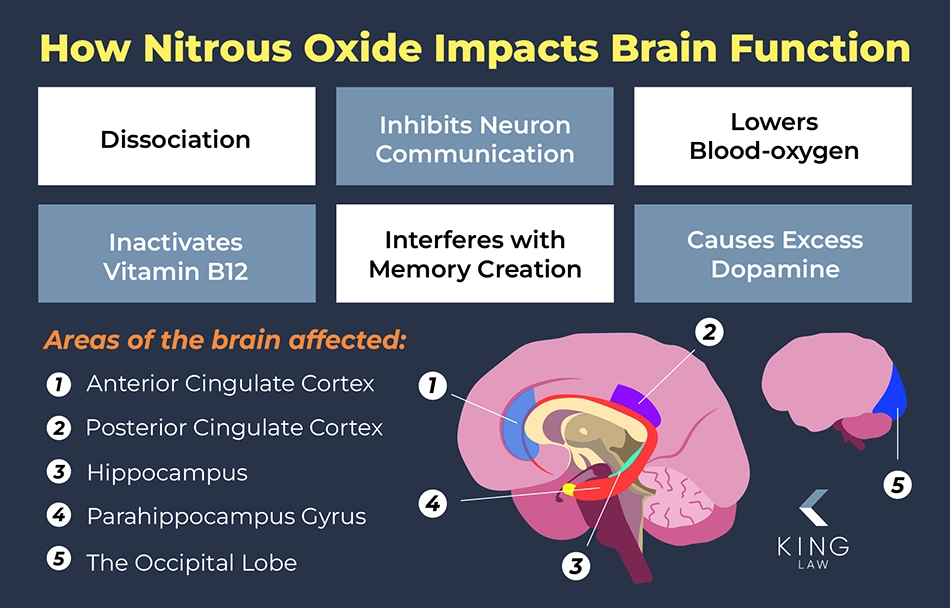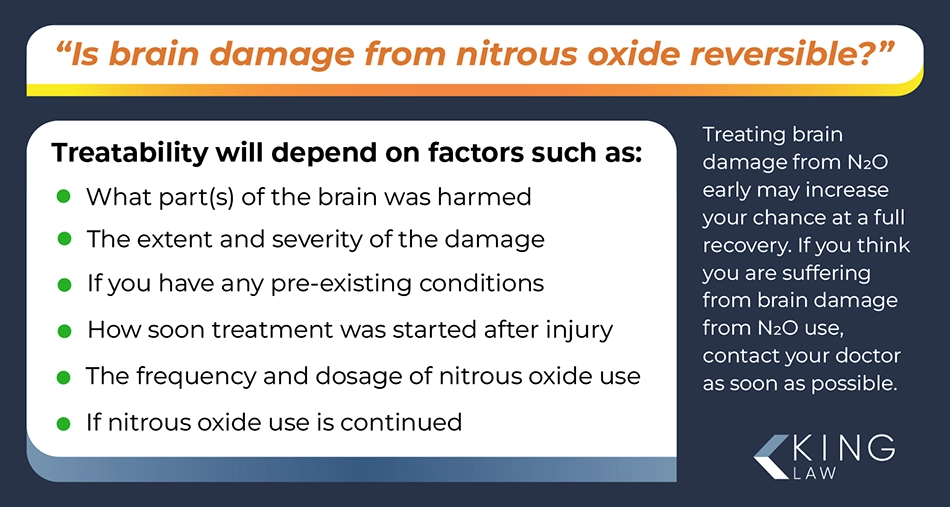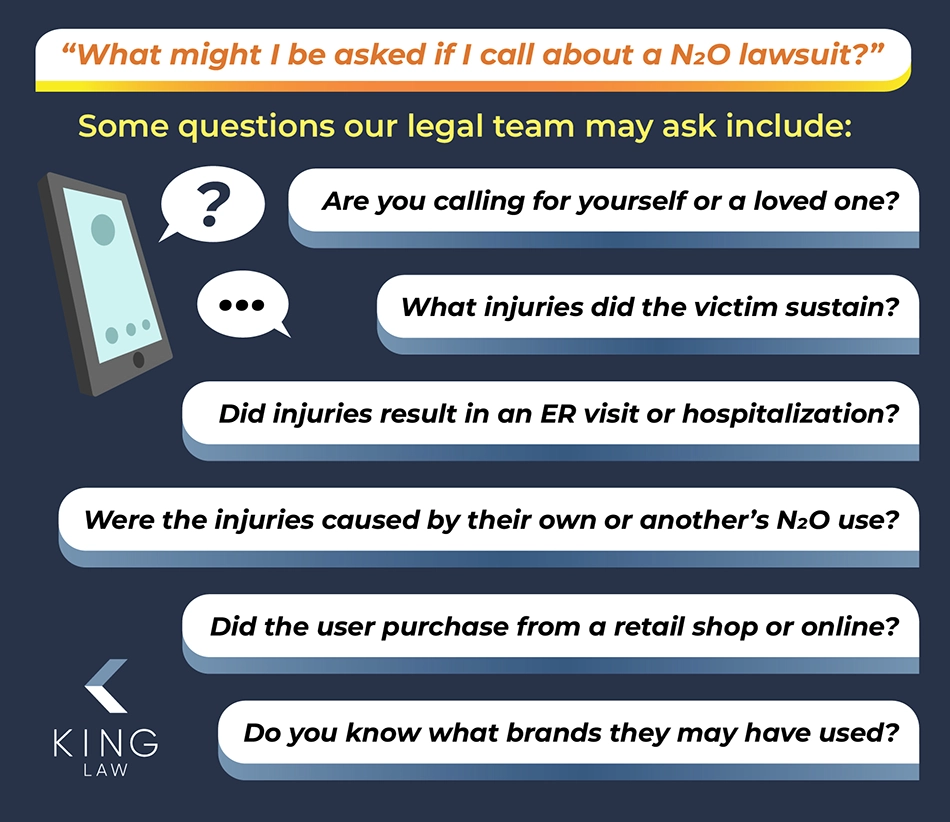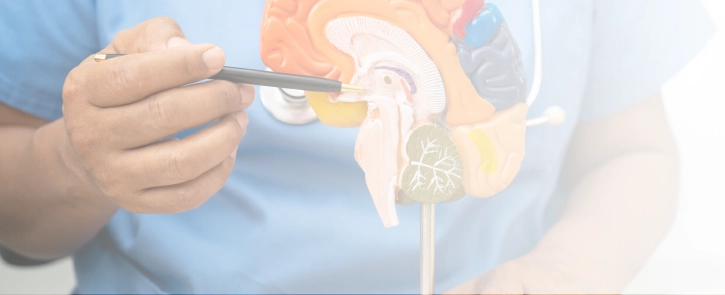
Inhaling pure nitrous oxide, which is also known as NOS or whippets, affects the brain in a number of ways. The drug is increasingly popular among young people throughout the United States because of the euphoric feeling it causes. However, nitrous oxide use can cause troubling and permanent brain, psychological, and nerve damage. Many people believe that companies that make and sell whipped cream charger products have been reckless by not warning consumers about potential brain injuries.
In this article, you will learn about how nitrous oxide can affect your brain, including the short-term and long-term effects of NOS gas. This page also discusses when and how nitrous oxide can cause brain damage, scientific research confirming these risks, and signs of brain injuries users can look out for. The article also provides information about when to contact a lawyer if you or your loved one were harmed by nitrous oxide.
About Nitrous Oxide Brain Effects:
What Does Nitrous Oxide Do To Your Brain?
What Parts of Your Brain Does Nitrous Oxide Affect?
Does Nitrous Oxide Kill Brain Cells?
Can Nitrous Oxide Cause Brain Damage?
Is Brain Damage From Nitrous Oxide Reversible?
Can People Become Addicted to Nitrous Oxide?
Studies on Nitrous Oxide and Its Effects on the Brain
Warning Signs of Nitrous Oxide Brain Effects
King Law Is Investigating Nitrous Oxide Cases
What Does Nitrous Oxide Do To Your Brain?
Inhaling nitrous oxide (N2O) interrupts many of the important functions of your brain. Nitrous oxide is a dissociative drug, which means it changes how your brain processes your feelings and senses. It can make you feel like your brain and body are not connected or are not communicating normally.
However, these euphoric sensations are not the only thing nitrous oxide does to your brain. Huffing the gas has a number of dangerous impacts on your brain. For example, N2O prevents your brain cells (neurons) from communicating with each other and to other parts of your body correctly. Nitrous oxide also reduces the amount of oxygen in your blood, therefore depleting oxygen levels in your brain.
Nitrous oxide also keeps your body from using vitamin B-12, which your nerves and brain cells use to stay healthy, talk to each other, and protect themselves. N2O also tricks your body’s NMDA receptors into thinking the N2O is glutamate. Your brain cells need glutamate to complete other processes, such as sending messages to other cells and forming memories. Without having the real glutamate, your cells cannot carry out these functions.
Nitrous Oxide Use and Dopamine Levels
Huffing nitrous oxide also increases the “feel-good” chemical (dopamine) in your system, which is one of the reasons people become addicted to it. For a few minutes, these changes can make you feel euphoric and giddy, feel like you are floating, and impair your memory. However, in the long term, they can cause complications like brain cell death, nerve damage, cognitive impairment, seizures, and psychosis or schizophrenia-like symptoms. You may not notice the negative effects of the drug on your day-to-day functioning until they have become severe or irreversible.
What Parts of Your Brain Does Nitrous Oxide Affect?
Nitrous oxide affects several different regions of your brain, including the cortexes, hippocampus, and the parahippocampal gyrus. These areas affect your memory, senses, and cognition. Here are some of the ways using recreational nitrous oxide can affect your brain:
- Activates the anterior cingulate cortex (which helps you manage emotions, pay attention, process pain, and recall or store memories)
- Slows down the hippocampus and parahippocampal gyrus (the areas in charge of memory, recall, and learning)
- Dulls the posterior cingulate cortex (the region that helps you think clearly, focus, take in information around you, and plan)
- Deactivates the visual association center of your brain
Nitrous oxide also activates the reward and pleasure centers of your brain, which is why people tend to feel euphoric and giddy when they inhale it. These good feelings are also why many young people are becoming addicted to it.
When these areas are not working properly, it can make it harder for you to control your thinking and body, see clearly, make safe and rational decisions, or make new memories or remember old ones. Unfortunately, if you use a lot of nitrous oxide at one time or use it every day, some of these brain changes may become permanent.

Does Nitrous Oxide Kill Brain Cells?
Nitrous oxide can set off a chain reaction that can kill your brain cells. NOS stops your body from processing vitamin B-12, which is needed to break down chemicals like homocysteine. If you have too much homocysteine in your system, it can cause your brain cells to die. High levels of homocysteine in your system can also make you experience cognitive deficits, such as memory issues. Long-term or even one-time heavy use of nitrous oxide can lead to nerve and brain damage, including permanent spinal cord damage and paralysis. Brain cells can also die from a continued lack of oxygen. Inhaling nitrous oxide displaces oxygen in your lungs. So, taking consecutive hits of the gas may lead to oxygen deprivation (hypoxia) and eventual brain cell death.
Can Nitrous Oxide Cause Brain Damage?
Nitrous oxide use can cause temporary and permanent brain damage. NOS can make you have a Vitamin B-12 deficiency, because it changes how your body takes in and uses this essential vitamin. Your nerves and brain cells need vitamin B-12 to create a protective layer around them called myelin, which is like the rubber tube that electrical wires go into. Vitamin B-12 is also used to break down chemicals (like homocysteine) to make proteins and lower inflammation in the brain.
Study About Nitrous Oxide and Neurological Damage
A 2024 study found that about 96% of people with nitrous oxide-induced vitamin B-12 deficiencies had neurological damage. Some of the challenges these patients faced included problems staying balanced, trouble walking, weakness, “pins and needles” feeling, and nerve damage. Sometimes, these issues are temporary, and they may improve or go away with treatment. However, even some young, healthy people who have only used nitrous oxide once have experienced long-term brain and spinal cord damage.
Is Brain Damage From Nitrous Oxide Reversible?
The brain damage caused by N2O misuse may be temporary or permanent. It depends on many factors, such as how much nitrous oxide the person used, how often, how long they waited to seek treatment, and any pre-existing conditions they have.
Yale Medicine reports that nitrous oxide users who get specific vitamin B-12 treatments from their doctor early on have the best chance of reversing paralysis and other nerve damage they may experience. Additionally, the person should stop all nitrous oxide use after they get treatment so they do not undo the positive changes from treatment. Because nitrous oxide is out of your system within minutes, you need to clearly tell your doctor that you use NOS. Otherwise, they may not have the information needed to give you the correct treatment.

Can People Become Addicted to Nitrous Oxide?
One of the side effects of nitrous oxide is a type of mental addiction to the drug. This means people’s brains think they need the drug to feel happy or normal. The addiction people experience to nitrous oxide is not like most other drugs. That is because people cannot become physically addicted to nitrous oxide in the way they become addicted to things like alcohol or opiates. Instead, people become psychologically addicted to N2O. They can become psychologically addicted and dependent on the drug because it interferes with normal dopamine levels in the brain. This means their brains think they need the drug to feel happy or normal.
Studies on Nitrous Oxide and Its Effects on the Brain
Researchers have studied how nitrous oxide impacts someone’s brain. They have discovered how the gas interacts with your brain cells and changes how they work. They have also noted how the increase in euphoric and giddy feelings tends to drive up someone’s use of nitrous oxide.
Study: Mechanisms Involved in the Neurotoxicity and Abuse Liability of Nitrous Oxide
A 2022 research article reviewed dozens of other studies about nitrous oxide and how it can harm someone’s brain and nerves. The authors noted that N2O can damage the brain because it keeps your body from using vitamin B-12 (also called cobalamin). So, while someone may have normal levels of vitamin B-12 in their system, the nitrous oxide keeps them from using it. Additionally, nitrous oxide causes your body to think its NMDA receptors are receiving glutamate, when they are not. This can disrupt how the person’s brain sends and receives signals. Whippets can also increase how much dopamine is in your system, which can make you experience euphoria, psychosis, and even schizophrenia.
Study: Nitrous Oxide Exerts Rewarding Effect via Regulating D1 Receptor and BDNF Pathway in VTA–NAc Circuit
Nitrous oxide can be very addictive, even though it does not have a specific substance in it (like nicotine) that scientists would expect to cause addiction. Researchers studied how nitrous oxide interacts with your brain, and they discovered that NOS can activate one of the addiction centers of your brain (the ventral tegmental area). This region of your brain is associated with rewards, learning, memory, and stress, which are all factors in forming habits and addictions. Nitrous oxide was found to increase the dopamine in this pathway in your brain, which can reinforce the behavior of using whippets for fun. Unfortunately, these kinds of brain changes can also impact your mental health.
Study: Neurotoxicity Mechanisms and Clinical Implications of Six Common Recreational Drugs
A 2025 scientific review explored how drugs like nitrous oxide can harm someone’s brain and nerves. According to the authors, nitrous oxide interrupts how your body uses vitamin B-12 and creates the protective coating (myelin) around your nerves and brain cells. Nitrous oxide also increases dopamine levels and prevents your NMDA receptors from getting glutamate, which they need for your brain cells to work properly. People who use nitrous oxide may experience spinal cord injuries, brain damage, paralysis, sensory issues, and even mental health issues.
Warning Signs of Nitrous Oxide Brain Effects
If you are experiencing any of the following symptoms, you may be at risk for brain damage from nitrous oxide misuse:
- Numbness or tingling
- Difficulty thinking straight or managing your emotions
- Sensory changes (e.g., vision, smell, or hearing)
- Balance problems
- Difficulty walking
- Coordination issues that are new or different
- Paralysis (e.g., inability to move or feel parts of your body)
- Strength issues (e.g., not being able to lift, move, or grip something with your body)
Seek medical attention as soon as you notice these or any other worrying changes, as they may be a sign of a serious underlying brain or nerve issue or nitrous oxide poisoning.
Make sure to tell your doctor that you used nitrous oxide. They will not be able to tell that you took nitrous oxide unless you tell them, because nitrous oxide will not show up in blood or urine tests. Without this information, they cannot give you the correct treatment.
What To Do If You Think Nitrous Oxide is Harming Your Brain
If you suspect that your recreational nitrous oxide use is harming your brain or nervous system, you should seek medical care immediately. Medical professionals will help you stop or cut back on the amount of nitrous you are using. Early intervention is key in recovering from nitrous oxide-induced brain injuries. You may need vitamin treatments, psychiatric treatment, physical therapy, or addiction treatment to overcome what N2O has done to your body. These treatments will be crucial to reclaiming your health and wellbeing.
King Law Is Investigating Nitrous Oxide Cases
If you suffered from brain or nerve damage after taking nitrous oxide, you may be entitled to compensation. Many people who have used NOS for fun believe they were misled by the companies that made and sold the products to them. Victims think the N2O manufacturers were dishonest about the risks of using whippets recreationally.
King Law is accepting cases where victims experienced N2O-related paralysis, brain damage, or nerve injuries. We do not charge clients any fees for meeting with us, and we offer complimentary case reviews of potential nitrous oxide lawsuits. We only get paid if we can help you secure compensation for your injuries.

Contact a Nitrous Oxide Lawyer Today
If you were harmed by a nitrous oxide product, reach out to our team today by calling (585) 496-2648. Our intake specialists are ready to take your call and discuss your legal options. Our attorneys have experience handling these types of cases, and we can help you confidently navigate the legal process. Our team and legal partners are ready to take on the nitrous oxide manufacturers who sold a dangerous product without proper warnings.

